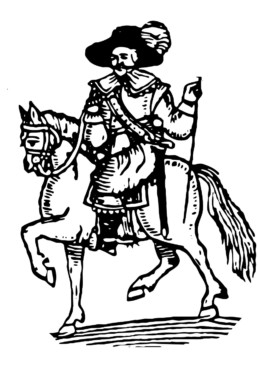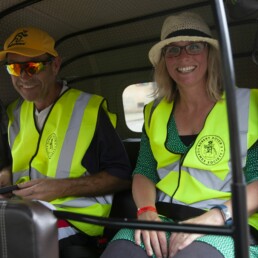The History
Who was Robert Dover?
Robert Dover was born in Norfolk sometime between 1575 and 1582, one of four children born to John Dover. He went to Queens College Cambridge to study Law, where he met a nephew of Baptist Hicks, a great benefactor of Chipping Campden. Having qualified he worked in Lincolns Inn as a lawyer before moving to Saintbury with his wife Sebilla to join his sisters in 1611.
Having moved to the area, Robert Dover came up with the idea for a modern Olympics-style competition to positively channel some of the more competitive traits of the local people. It is believed his vision was backed by Baptist Hicks, a rich mercer or cloth dealer who had financed a great deal of James I early reign and was at that time building his beautiful mansion by the church in Chipping Campden.
This theory is supported to some degree by the chosen location of Dover’s Hill and what is now known as the Mile Drive and the Gallops. Dover almost certainly took over existing Whitsun festivities which took place in the town. The new location, about half a mile outside of Chipping Campden, made it easily accessible but far enough away to avoid damage and vandalism if the competitive spirit got out of hand.
The History
Here Come The Puritans
By 1636 the rising tide of puritanism was vocal against sporting contests, racing, dancing, singing, in fact all forms of fun and entertainment-. The King, conscious of the need for a fit, strong, athletic and skilled population from which to recruit troops, encouraged sports of any kind. Thus Prince Rupert’s probable visit and the publication of a collection of poems supporting “Dover’s Olympicks” by poets such as Ben Johnson and Michael Drayton would have gained royal encouragement and possible patronage. The quality of the paper and binding of Annalia Dubrensis suggest an affordable -original price and therefore widespread distribution and appreciation. It was not unusual for the rich and famous to travel more than 50 miles to attend and occasionally take part.
The History
Shakespeare. Did the bard attend the games?
Although Shakespeare died in 1616, the last four years of his life coincide with the first four years of Dover’s Games and, as he spent these years in Stratford upon Avon, it is inconceivable he did not know of their existence. Indeed, the wrestling scene in As You Like It and the line “how did your dog run on Cotsall (Cotswold)?” in the Merry Wives of Windsor are thought to be about the Games. Although written earlier, these plays weren’t published until the 1620’s and revisions and additions were common place, especially to suit local audiences.
In 1612 the then Prince of Wales, Henry Frederick was a sporting enthusiast and his court often staged masques, mock battles and sporting contests, all very similar to Dover’s celebrations, albeit adapted to a more modest rural style.
The History
Civil War
The Civil War in 1642 curtailed most non-military or essential activities and so Dovers Games was suspended. Although Dover himself died before the restoration when Charles II took over the throne the Games were instantly revived. It says something about their enduring popularity that, after a gap aound eighteen years and with their founder dead, the show was back on.
The next two hundred years saw peaks and troughs in popularity but the core activities, athletics, throwing, jumping, wrestling, horse racing and of course eating and drinking remained. Gambling of many types, fortune telling and sharp practises appeared from time to time and music was constantlty present.
The Book of the Games
Annalia Dubrensis
The original version of this book was to some degree a series of semi-political pamphlets published in 1636 and is an anthology.
Some poems were written especially and some were previous works that just fitted the bill.
The authors were a mix of national and local figures with various levels of talent. The binding and production is best described as affordable and made its distribution more widespread. It’s probable its aim was to counteract the rising puritan opposition to sports, games and anything considered frivolous or enjoyable. It’s also probable it had Royal support and patronage. Indeed, can it be no coincidence that Prince Rupert is reported to have attended the Games in 1636, the same year as its initial publication? Armies at the time were recruited locally, so a fit and relatively athletic young male population was essential. Certainly, the ensuing Civil War dragged many of the area’s young men in to the military, on both sides.
Mass publication of the printed word, especially in English had only been around for about a hundred years and much of the population were either semi-literate or illiterate, so tracts in verse were easier to learn, remember and pass on. Poetry is a powerful tool in propaganda, as songs are essentially poems set to music, which stir nations and individuals alike.
You can download the Annalia Dubrensia here to read on most devices including your Kindle.
If you are interested in literature, why not get involved with the annual Chipping Campden Literature Festival.
The History
Shin Kicking
Probably the most notable change in the original sports was the development of Cotswold Wrestling in to the very localised version known as Shin Kicking. Cotswold Wrestling, like the Cornish and Cumberland versions, involved both men gripping their opponent’s shoulders and attempting to trip or throw him to the ground. The tripping or leg work was known as underplay and over the years, with local inter-village rivalry as a catalyst, the tripping became kicking and dominated the sport. The referee, known as the stickler, used a stock or staff between the combatants to control things and a match could only start when he withdrew his staff and kicking commenced. The phrase “a stickler for the rules” is believed to have originated from this practise.
By the 1750’s steel toe caps were common and all manner of potions were used to pickle the shins. It was also rumoured that some contestants used gall on their boots to make wounds much more painful.
Backswords was another martial sport that continues to the present day, each man has a long sword and a dagger, both made of wood. The shout of “God bless our eyes” starts a bout and it continues until blood is drawn from the head. For this reason, the sport is no longer entirely traditional, as serious injury, including the loss of an eye was not unknown.
The History
Sir Baptist Hicks – Moneylender to James I
Baptist Hicks was a local benefactor. His legacy included putting the local Grammar School on a firm financial footing by managing the trust that financed it; building the Alms Houses, complete with clean piped water and building the Market Hall in the centre of Chipping Campden. His influence with the Royal Family meant that Robert Dover received royal patronage. Another local dignitary, Endymion Porter from Aston Subedge, secured a suit of the King’s old clothes for Dover to wear at the Games. The style as depicted on the frontispiece of Annalia Dubrensis seems to indicate a date between 1620 & 1636, indeed it is strongly rumoured that Prince Rupert attended the Games in 1636.
The History
Death & Revival
This second phase of the Games came to a close in 1862, not because of drunkenness, rowdy behaviour and vandalism, as has been reported but simply because vested interests led by Canon Bourne of Weston Subedge wanted the land enclosed.
In 1951, as part of the celebrations for the Festival of Britain, the Games were revived. They proved so popular that it was decided to make them an annual event again but fate intervened just one year later, when an outbreak of foot and mouth disease closed all available land. In 1953 the Coronation celebrations took centre stage and the momentum was once again lost.
It wasn’t until ten years later that a group of the Scuttlebrook Wake Committee restarted the Games and by the late 1960’s they had their own Committee and Constitution. Various ups and downs have followed, including an abortive attempt to move both the day and the venue, but tradition prevailed.
The Silver Jubilee in 1977 was a total wash out for the Games and the following years were run on a wing and a prayer, as funds were almost non-existent. Since then things have gone well except early in the new millennium when foot and mouth again caused a cancellation.
2012 brought our four hundredth anniversary and coincided with the Queens Diamond Jubilee not to mention the London Olympics.
In 2017 the games didn’t happen due to a lack of funds and personnel. Then in 2018 after an amazing effort to fundraise the Games were back once again with renewed vigour and, hopefully, the future is bright!
The results
Our history team are busy trying to collate the currant champion of each event. Please check back soon.
Shin-Kicking
- Firstname Surname
Champion of the Hill
- Firstname Surname
Championship of the Hill
- Firstname Surname
Tug ‘O War
- Firstname Surname
Running Races
- Firstname Surname

Friends of the games
The Cotswold Olimpicks is funded by gate receipts and the generous donations from the local and wider communities. When the games were first held in 1612, £10,000 was spent on creating the spectacle we know and love – that’s roughly £1.2m in today’s money. Fortunately we’ve managed to reduce that considerably but we still need around £25,000 a year to stage the games. If you or your company would like to help, or get involved, please talk to us about how you can make a lasting impact to one of the country’s most important historic sporting events.
Volunteers
Volunteers are the backbone of our organization and Olimpick community, and their dedication and service are greatly appreciated. It is important to recognize the efforts of volunteers and to show them respect and appreciation for the work they do and we ask that all visitors to the games do this too.



